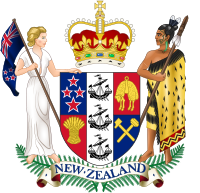New Zealand Parliament
| New Zealand Parliament | |
|---|---|
| Founding: | January 17, 1853 |
| Founding Act: | New Zealand Constitution Act 1852 |
| Current law: | Constitution Act 1986 |
| Issued on: | December 13, 1986 |
| Came into force on: | January 1, 1987 |
The Parliament of New Zealand ( English : New Zealand Parliament , Māori : Pāremata Aotearoa ) is the supreme legislative power in the island state of New Zealand . Parliament is made up of two parts,
- the Sovereign , the Queen of New Zealand, represented by the Governor General of New Zealand and
- the New Zealand House of Representatives ( House of Representatives ).
The seat of parliament is in Wellington , the capital of the country.
history
On January 17, 1853, the British Parliament passed the New Zealand Constitution Act 1852 , which gave the former colony of New Zealand more rights of self-determination and introduced parliamentarianism . Initially, the parliament, called the General Assembly , consisted of a bicameral system in which the members of the Legislative Council , the upper house , were appointed by the British crown and the House of Representatives , as the lower house , made up of the elected representatives of the six provinces at the time educated. At the time, only men over 21 years of age who owned, leased or owned land were allowed to vote. While the members of the House of Representatives were each elected for a legislative term of five years, the representatives of the House of Lords who could reject legislative decisions of the House of Commons received their seats for life, but in 1891 their term of office was reduced to 7 years.
With the Statute of Westminster Adoption Act 1947 , New Zealand received full sovereignty in 1947 and the Legislative Council was abolished with effect from January 1, 1951 , so that New Zealand's parliamentary system is now a unicameral system.
Parliament today
The House of Representatives of New Zealand is often erroneously referred to as Parliament in German-speaking countries, since the elected representatives of the people sit in the House of Representatives. Since the political system of New Zealand is based on a constitutional monarchy , in which the head of state is a hereditary monarch (the ruler) and exercises the power and functions of the ruler - albeit within constitutional restrictions - the head of state belongs to the parliamentary system of New Zealand. The head of state, represented by the governor general of New Zealand , opens the constituent session of parliament, calls parliament to its regular sessions and can also dissolve power of its powers.
New Zealand does not have a constitution in which the role and tasks of parliament are laid down in a document. Parliament draws its constitutional tasks, how it is to work and how it is formed, from the various laws, such as
- the Legislature Act 1908 , which describes the legislative power,
- the Constitution Act 1986 , which ended the UK Parliament's jurisdiction over New Zealand legislation,
- the New Zealand Bill of Rights Act 1990 , which defines human rights , democratic rights and civil society rights ,
- the Electoral Act 1993 , which governs elections to the House of Representative .
See also
literature
- Raymond Miller (Ed.): New Zealand - Government and Politics . 3. Edition. Oxford University Press , Melbourne 2003, ISBN 0-19-558464-3 (English).
Web links
- Homepage . New Zealand Parliament,accessed October 29, 2014.
Individual evidence
- ↑ a b How Parliament works - Fact sheets - Parliament Brief: What is Parliament? . New Zealand Parliament , accessed October 29, 2014 .
- ^ NZ Constitution Act comes into force . New Zealand History Online , accessed October 29, 2014 .
- ^ New Zealand Sovereignty: 1857, 1907, 1947, or 1987? . New Zealand Parliament , accessed October 29, 2014 .
- ↑ abolished Legislative Council . New Zealand History Online , accessed October 29, 2014 .
- ^ Legislature Act 1908 . New Zealand Legislation , accessed October 29, 2014 .
- ^ Constitution Act 1986 . New Zealand Legislation , accessed October 29, 2014 .
- ^ New Zealand Bill of Rights Act 1990 . New Zealand Legislation , accessed October 29, 2014 .
- ^ Electoral Act 1993 . New Zealand Legislation , accessed October 29, 2014 .

